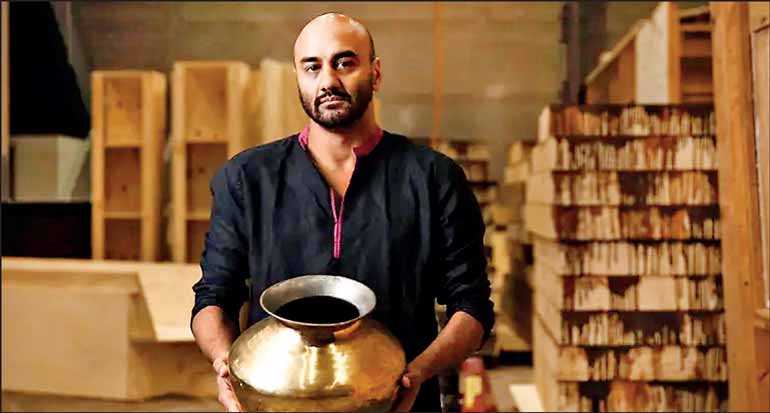Saturday Feb 21, 2026
Saturday Feb 21, 2026
Friday, 28 December 2018 00:00 - - {{hitsCtrl.values.hits}}

www.smh.com.au: Shakthi has always known that the stage is the kind of space on which complex truths could unfold. The artist and playwright, whose formal name is S. Shakthidharan, remembers watching his mother, a classical Indian dancer who moved to Australia from Sri Lanka in the early 1980s. That feeling never left him.
“I have a Tamil Sri Lankan background and my mother has been a Bharatanatyam dancer, since she was nine – when she came to Australia, after my parents divorced, she had no other way of earning money, so she returned to dance,” says Shakthi, 35, who’s wearing a turquoise shirt and navy-blue cap. “It was very clear to me that the stage was a sacred place where you could do things that weren’t possible in the rest of society.” His voice drops an octave lower. “Sri Lanka had a civil war for 35 years and the task we have when it comes to reconciling our community is realising that we can have many truths in one place. There are greater, more important things than being right.”
This commitment to honouring multiple truths is rare in a moment often ruled by soundbites and slogans. But it’s the foundation of Shakthi’s debut full-length play Counting and Cracking, an epic story that revolves around a mother and son, Radha and Siddhartha, and follows four generations of a Sri Lankan-Australian family across lives spanning Colombo and Western Sydney. The play which premieres as part of Sydney Festival in January is a co-production between the Belvoir Theatre and Co-Curious, the sister company of CuriousWorks, the arts organisation Shakthi founded in 2005.
At Belvoir’s upstairs rehearsal space, a scale model of a Sri Lankan town hall occupies a far corner. Nearby, a wall is papered with colonial-era images – bungalows, verandahs, palm trees. Cast and crew on their lunchbreak add to an air of collective jubilance, the warren of rooms filled with snatches of laughter and conversation. If Counting and Cracking feels momentous, it’s for good reason. Shakthi tells me that the play represents almost a lifetime spent reckoning with his personal history – as well as the wider experiences of his community. It also reflects his desire to portray the Australia in which he grew up.
“My mum pushed me into embracing Australia and in my early 20s, I realised that I knew more about pre-war Germany than my country’s history which felt wrong,” says Shakthi, who’s thoughtful and articulate and often punctuates his responses with an infectious laugh. “She didn’t support it, but I started researching this play, talking to Sri Lankans from around the world, refugees, my distant family. Counting and Cracking took shape when I realised that the story about the weight of history and politics was connected to the story of love and friendship and parents and the silly things we do together. Growing up, I had friends from many cultural backgrounds, I loved cricket and beer but went to temple on weekends. I saw that story being told nowhere. There are systemic reasons for that.”
So much of how we understand theatre in Australia revolves around Anglo-centric traditions: workshops, casting calls, writers’ rooms. At CuriousWorks, Shakthi embraced a grassroots approach that was premised on giving as much as taking. Writing Counting and Cracking, he says, was just as much about the power of communal stories. “The project developed over a series of worldwide conversations, at kitchen tables over whisky and this is not how Western theatre thinks about writing plays but that’s perfectly OK,” he laughs.
The same goes for his narrative references, which pan a little wider than, say, Chekhov or Ibsen. “It’s a mystery and love story but there’s also influences like [Hindu epic] Mahabharata,” he says, citing a wedding scene in ‘70s Sri Lanka involving 19 actors and a family matriarch as a private highlight of the play. Not, he says, that expanding an art form is free of challenges.
“The script has six languages and when you’re working on a production this big, it’s hard to convince the necessary parts of the industry to support it,” he says.
For Shakthi, this is where the collaboration with Belvoir – sparked when artistic director Eamon Flack saw him read an early draft when he was an associate artist at Carriageworks – comes in.
“Working with Eamon has been like following a current, both hard and exhilarating,” he explains. “It’s a new style of collaboration. We would be lying if we said we understood where it was going.”
“Shakthi is brilliant at finding the deep human underpinnings of a story,” Flack adds. “He has an extraordinary patience for honouring the source of his ideas which are rooted in real lives, real struggles, real traumas.”
For Shakthi, one of the most rewarding parts of the process is watching his mother come full circle.
“My mother read the first draft and then started coming to showings and Eamon would turn to her and say, ‘what do you think about that?’ and the stuff she is saying is working its way into the final draft,” he grins. “Counting and Cracking isn’t about letting migrant Australians speak – it’s about pieces of art taking their rightful place as Australian stories.
“[It’s] about the universe that can exist inside a middle-aged woman who’s encountered every struggle and rebuilt her life.”
Counting and Cracking premieres at Sydney Town Hall from January 11 to February 2, as part of Sydney Festival before heading to the Adelaide Festival. (Source: https://www.smh.com.au/entertainment/western-sydney-playwright-shakhti-on-bringing-sri-lanka-into-australian-story-20181217-h197g1.html?ref=rss&utm_medium=rss&utm_source=rss_feed)